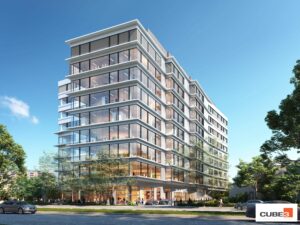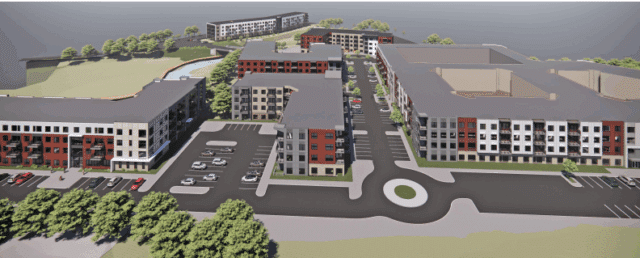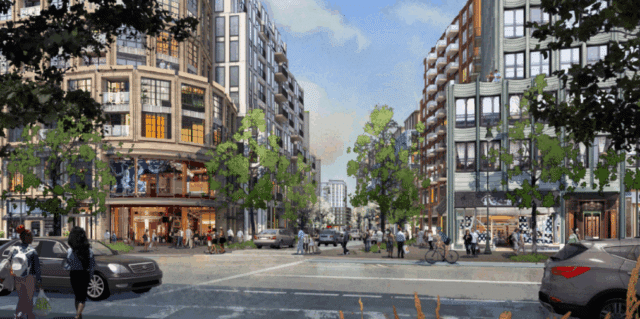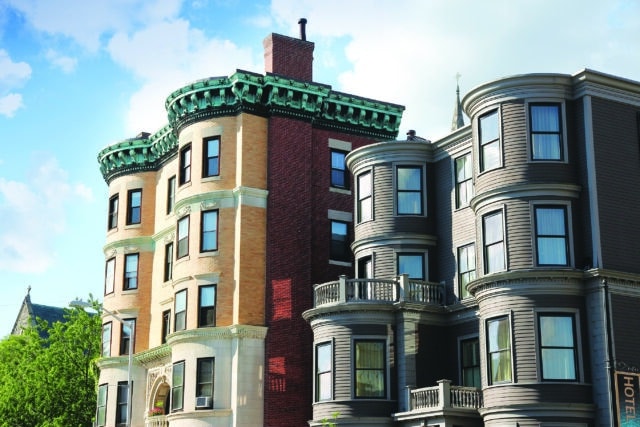
Rise Construction Management is facing a lawsuit from Avidia Bank over a $25 million loan secured by its proposed-but-never-built lab project in Medford's Wellington Circle. Image courtesy of Cube 3 and Jacobs
With August ending in cool weather, it may have felt like fall came a little early, but now you’re officially back in the saddle post-Labor Day. So, what did you miss?
Here’s a roundup of the biggest Massachusetts real estate stories you missed while you were on vacation.
MBTA Communities Law Starts to Bear Fruit
We’ll start with some good news.
Despite all the towns and cities that opted for so-called “paper compliance” upzonings that contained backdoor ways to keep housing from happening, the MBTA Communities law is still managing to generate not-insignificant amounts of housing proposals.
Trammell Crow Residential is seeking to build 752 apartments on the site of an old factory in Braintree, BXP broke ground on a 312-unit apartment building in Lexington and Nordblom Co. is pitching a 57-unit complex in Burlington, to name a few of the projects now in the pipeline.
Those come on top of the roughly 1,100 apartments and condominiums in the pipeline in Lexington, plus another 16 potential development sites grandfathered in to an older, more expansive version of that town’s MBTA Communities zoning.
The Healey administration also kicked off process this summer for getting more state-owned land into development, taking advantage of some mild as-of-right zoning reforms tucked into last year’s big housing bill. Of the 450 acres identified by officials in June, the first six are headed to auction Sept. 10.

Trammell Crow Residential is seeking to build 752 apartments on a Braintree site upzoned via the MBTA Communities law. Image courtesy of bh+a
The Fall of Rise Together?
A Bertucci’s in Medford is ground zero for the fall of a once high-flying Boston development firm.
Rise Together and Rise Construction Management burst onto the scene in 2021 with political buzz, a vision of changing how real estate development was done in Greater Boston and big lab development proposals in Charlestown’s Sullivan Square.
Now, with the Boston lab real estate market thoroughly oversupplied, that Wellington Circle restaurant property faces a foreclosure sale pending bankruptcy proceedings. And Avidia Bank, which provided the $25 million loan Rise used to buy the site, is suing the development firm and claims it could lose up to $17 million in the deal.
Two of the company’s three founders made personal guarantees on the Bertucci’s loan, Avidia’s lawsuit says. A waterfront project near the Boston-Quincy line where Rise was a joint-venture partner also fizzled last year amid a bankruptcy filing.
It’s not just Rise that may have been swimming without its proverbial swimsuits as the tide went out. British student housing developer Scape faces a Sept. 16 auction for its permitted-but-unbuilt 28-story apartment tower at 2-6 Charlesgate West. in Boston’s Fenway neighborhood. And restauranteur-turned-developer Jon Cronin confirmed he’s agreed to hand the keys to his high-profile St. Regis Residences luxury condominium tower in Boston’s Seaport District back to his mortgage lender after sluggish sales, a lot of competition on the horizon and a weak condo market.
Cronin’s still trying to sell the St. Regis’ $49 million penthouse, which he bought from his company to finish and sell independently.

Buyers and sellers, both concerned about the economy for different reasons, seem to be causing condo inventory to build up. iStock illustration
D.C. Drags Down Housing Markets
Speaking of weak condo markets, Greater Boston’s saw a whopping 59.5 percent year-on-year spike in inventory available for sale in Essex, Middlesex, Norfolk, Plymouth and Suffolk counties in July, according to numbers from the Massachusetts Association of Realtors.
Why? The market’s at “peak uncertainty,” as one commentator told us. At the low end, potential buyers are worried about whether President Donald Trump’s tariffs and cuts to education and research funding will tank the local economy. At the higher end, buyers have the luxury of waiting out any potential turbulence. And sellers crowded into the spring market trying to secure top dollar before what they fear will be a price decline.
That softness hasn’t spread to the single-family market in Greater Boston, but Cape Cod and Worcester County both had roughly 10 percent more homes for sale in July than at the same time last year, per MAR data. It could be one of the best fall markets for buyers in years, observers say.
Either way, don’t expect home prices to feel “normal” again anywhere in the next 10 years, a Redfin economics analysis said yesterday. And the area sill has one of the largest housing deficits in the nation, Zillow economists concluded in July.
That’s not the only way national politics are playing out locally.
Apartment operators in student-heavy Boston neighborhoods like Mission Hill say that demand is softer this fall thanks to those same attacks on higher education funding and international students’ concerns about harsh Trump administration immigration policies.
It’s probably not welcome news for the city’s apartment-focused real estate agents, who were already dealing with an end to the region’s unique practice of making tenants pay the apartment broker’s fee, even when the landlord hired the broker.

Healthpeak proposed a 4.6 million-square-foot development in Cambridge’s Alewife Quadrangle neighborhood. Image courtesy of Elkus Manfredi Architects
Cambridge, Dedham Megadevelopments
At least two developers aren’t giving up on the idea that the life sciences can support a megadevelopment.
Dedham-based Supreme Companies unveiled plans last month for a 1.5 million-square-foot project on an undeveloped Dedham site just off Route 128. Plans show 644 apartments, a 100,000-square-foot hotel and 770,000 square feet of R&D space.
And Denver, Colorado-based REIT Healthpeak spent years assembling 46 acres in Cambridge’s Alewife Quadrangle neighborhood and, in June, proposed a 4.6 million-square-foot development after navigating city politics.
The project’s first phase, though, will notably be housing-heavy, with over half the proposed 2,076 homes as well as 1.3 million square feet of lab space.
That’s a playbook some developers of large sites are starting to run. Boston developer Bulfinch is seeking to sub out its plans to redevelop a Needham car dealership as a 500,000-square-foot life science complex. Instead, it hopes to turn the former Muzi Ford site into a mix of multifamily, hotel and medical office uses.
Copper Mill is perhaps placing the biggest bet on a housing-first approach for its megaproject. It secured city approval this summer for the first two towers – of a potential six total – for a three-parcel site next to the MBTA’s JFK/UMass station in Dorchester. The two towers will hold a collective 754 apartments, including 151 affordable homes.

A citywide rezoning plan approved in February is projected to enable development of nearly 3,600 new homes by 2040, according to an analysis by Cambridge’s Community Development Department. iStock photo
Cambridge Upzoning Hits Snags
If you were hoping to take advantage of Cambridge’s much-vaunted citywide upzoning, which passed in February, prepare to wait a bit longer.
It turns out the measure, which legalized the construction of 4- to 6-story multifamily housing (depending on affordability level) as-of-right across the city, did nothing to curb the city’s expansive definition of what’s a potentially historic property.
The potential for such a designation – which can kick in as early as the mid-1970s – can suddenly turn an as-of-right project into a discretionary one in certain neighborhoods by triggering review by the city Historical Commission or one of several “neighborhood conservation district” boards
One example of the standards used: A developer proposed replacing a 1931 bungalow on Newell Street with a larger single-family home in 2024. They had to negotiate design changes with the Historical Commission after the bungalow was cited as being among 11 “nearly identical homes” built by the same developer and its ownership by “multiple generations of the Cambridge Police Department.”
Three projects that housing advocates portrayed as test cases appear to suggest those reviews are a major obstacle to turning the city’s upzoning into real homes.
A housing-plus-hotel development in Harvard Square had sought to move the decaying former home of a 19th century writer and abolitionist one lot over and restore it, while wrapping the new building around it. The Cambridge Historical Commission voted unanimously in August to study landmarking the home, which would give the commission significant powers to force design changes, including to the building’s height.
One of the city’s few Black-owned funeral homes decided to close and sell its property to a developer with plans for a 6-story residential building. But the 2.5-story property’s association with several generations of prominent Black Cantabrigians triggered a year-long demolition delay that could reportedly render the project financially infeasible, the developer’s attorney told The Cambridge Day. Negotiations between the Historical Commission and the developer are ongoing at last report.
And the Mid-Cambridge Neighborhood Conservation District Commission in August denied a developer’s request to demolish a 14-unit apartment building on Ellery Street in favor of a 6-story, 81-unit residential building.
At least one other city in Greater Boston is looking to upzone itself. A Progressive majority on Medford’s city council wants to legalize six-unit multifamily developments by right in a big swath of the city near its three MBTA stations. But the proposal is opposed by the mayor and, even if it passes in current form, is limited by high parking requirements and a 3-story height cap.






